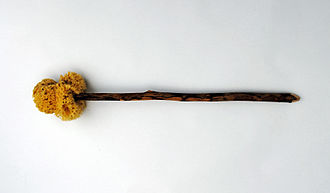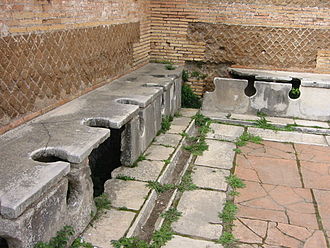"I Thirst"
Who offered Jesus what when to drink as he was on the cross.
On Ace of Spades one evening…

heraldnet.com
…the discussion turned to alternatives.
Posted by: Cicero Kaboom! Kid aka Omega old man with his tonic and gin at March 18, 2020 10:32 PM

Jesus on the cross was offered poisoned wine. Unlikely the Romans would allow drugged relief to the crucified - more likely Jews would secretly offer the poison to the dying.
He refused. He would live mortal life to the fullest.
He was at the end offered unpoisoned drink, which he took. Enough to loosen his tongue for his last words.
Some suggest his expiration right after the drink meant he did take the poison. I don't think so.
Mark 15:23
Matt 27:34
John 19:28-30
Luke 23:36 is unclear on the matter.
Anyone with better knowledge feel free to correct my humble scriptural scholarship. No Holiday Inn Express for me.
I have... never before encountered the idea that Roman soldiers used the sponges that corked their wine bottles to wipe their butts. Or that that was what Jesus was offered. Ugh. Must've been in Mark 17.
Posted by: mindful webworker at March 18, 2020 11:07 PM
He refused. He would live mortal life to the fullest."
I have never heard it taught that this was poison; I understood that Gall was an early extract of opium, which was sometimes given to dying criminals to ease their suffering, if the Roman guards felt sorry for them. By all accounts, it had a very bitter taste.
and I think saying that sponge story is just silly. You wouldn't cork wine with a sponge, then or now. As far as having them around, they were a seafaring people. They would have hide piles of sponge around for many uses.
Posted by: Tom Servo at March 18, 2020 11:16 PM
Well, this sent me into some research. I knew one place I had read about the sponge bottle stopper, but the source is, um, not one that can be cited as authority.
Urantia Paper 187 - Crucifixion
This has the Jewish women offering Jesus the narcotized wine, which he refused.
Here Jesus tells the guards "I thirst," and one offers him non-drugged wine on his javelin using "saturated sponge stopper."
When Jesus saw them eat and drink, he looked down upon them and said, “I thirst.” When the captain of the guard heard Jesus say, “I thirst,” he took some of the wine from his bottle and, putting the saturated sponge stopper upon the end of a javelin, raised it to Jesus so that he could moisten his parched lips.
Jesus had purposed to live without resort to his supernatural power, and he likewise elected to die as an ordinary mortal upon the cross. He had lived as a man, and he would die as a man—doing the Father’s will.
Finally, Jesus' again had his thirst slaked by the Captain.
But, as I said, it's Urantia Papers. Funny thing about the Urantia Papers is, when you go to digging, their info is frequently quite good. So I went to digging.
Romans Were Kinda Nasty
I searched on some terms like Ancient Roman, sponge, bottle stopper. Saw many nice amphora, interesting Roman links, but the main thing that came up was this:
The xylospongium or tersorium, also known as sponge on a stick, was a hygienic utensil used by ancient Romans to wipe their buttocks after defecating, consisting of a wooden stick with a sea sponge fixed at one end.
More at Wikipedia
So, I am enlightened as to this "hygienic utensil." How did I live so long without this vital knowledge?
One of "10 Truly Disgusting Facts about Roman Life" at ListVerse. Besides lice…
If you haven't had enough detail, the ListServe list linked to "Roman Plumbing: Overrated" at The Atlantic. Unpleasant.
So thus sated on Roman scatology, I turned back to searching on bottle stoppers.
Cork the Wine, Kiss That Girl
Google Books showed me a page from Understanding Materials Science: History · Properties · Applications, by Rolf E. Hummel, where I learned that cork bottle stoppers arose in the 17th Century. Also, there were many uses of sponges in Rome & Greece. However, bottle stopper was not mentioned as being one of those uses of sponges.
From another Google Books search result, Popular Science News, Volumes 13-14, I read that "Cork, like sponge, seems to have been specially designed for man's use and convenience." Cork, and sponge, in the same sentence. So close-doesn't-count!
Took a side trip to read about what the Romans were likely drinking.
The Romans used to drink “posca”, a mix of water and vinegar that was sold in the streets, similarly to coconut sellers in modern times. Posca was believed to give strength, while wine would make you drunk. (Posca fortem, vinum ebrium facit).
A sponge soaked in posca was offered by a praetorian to Jesus on the cross. In fact it was not a cruel gesture, but a sign of mercy of the soldier for a man agonising on the cross.
Acetabulum, a bowl containing a glass and a half of vinegar, where table companions used to soak small pieces of bread during the meal to favour digestion, was always present on the table, at the time of the Roman banquets.
"A sign of mercy." This goes back to the original commenter saying, "These were hardened Roman soldier executioners. They did NOT offer Jesus something to drink on a stick out of kindness."
You know, it was that Captain who, when Jesus fell on the way to Golgotha, forced Simon to carry Jesus' cross. How Jesus behaved and responded, even forgiving his executioners, was not lost on him. He was Captain, and had the authority to do what usually would never be done, give comfort to the condemned. And it was this Captain, who, when Jesus died, smote his breast and exclaimed Jesus' spirituality. Mark 15:39
Well, this was all educational, but I was about to give up on my search for validation of the Urantia Paper's statements about narcotic-offering Jewish women, and the other instances with the guards. Then I found…
Ellicott's Commentary for English Readers
(Orig 1905, ed. 1954, as far as I could tell)
They gave him vinegar to drink mingled with gall: and when he had tasted thereof, he would not drink.
(34) Vinegar to drink mingled with gall.—In Mark 15:23, “wine mingled with myrrh.” The animal secretion known as “gall” is clearly out of the question, and the meaning of the word is determined by its use in the Greek version of the Old Testament, where it stands for the “wormwood” of Proverbs 5:4, for the poisonous herb joined with “wormwood” in Deuteronomy 29:18. It was clearly something at once nauseous and narcotic, given by the merciful to dull the pain of execution, and mixed with the sour wine of the country and with myrrh to make it drinkable. It may have been hemlock, or even poppy-juice, but there are no materials for deciding. It is probable that the offer came from the more pitiful of the women mentioned by St. Luke (Luke 23:27) as following our Lord and lamenting. Such acts were among the received “works of mercy” of the time and place. The “tasting” implied a recognition of the kindly purpose of the act, but a recognition only. In the refusal to do more than taste we trace the resolute purpose to drink the cup which His Father had given Him to the last drop, and not to dull either the sense of suffering nor the clearness of His communion with His Father with the slumberous potion. The same draught was, we may believe, offered to the two criminals who were crucified with Him.
So there are the drug-offering mercy ladies, and here too is Jesus "resolute purpose to drink the cup which His Father had given Him to the last drop…."
And straightway one of them ran, and took a spunge, and filled it with vinegar, and put it on a reed, and gave him to drink.
(48) Took a spunge, and filled it with vinegar.—The “vinegar” was the sour wine, or wine and water, which was the common drink of the Roman soldiers. and which they at an earlier stage, and as in derision (Luke 23:36), had offered to the Sufferer. The sponge had probably served instead of a cork to the jar in which the soldiers had brought the drink that was to sustain them in their long day’s work. Some one, whether soldier or Jew we know not, heard, not only the cry, “Eli, Eli, . . .” but the faint “I thirst,” which St. John records as coming from the fevered lips (John 19:28), and prompted by a rough pity, stretched out a cane, or stalk of hyssop (John 19:29), with the sponge that had been dipped in the wine upon it, and bore it to the parched lips of the Sufferer. It was not now refused (John 19:30).
And gave him to drink.—The Greek verb is in the imperfect tense, as implying that while he was doing this, the others tried to interrupt him.
That last bit is interesting. Once the 'festivities' got going, nobody could've offered the crucified anything without the Captain's permission. If he was doing it himself, nobody there could order him not to.
But did you catch it? "The sponge had probably served instead of a cork to the jar in which the soldiers had brought the drink…."
As to how a sponge could serve as a stopper, just give it some thought. You'll work it out.






